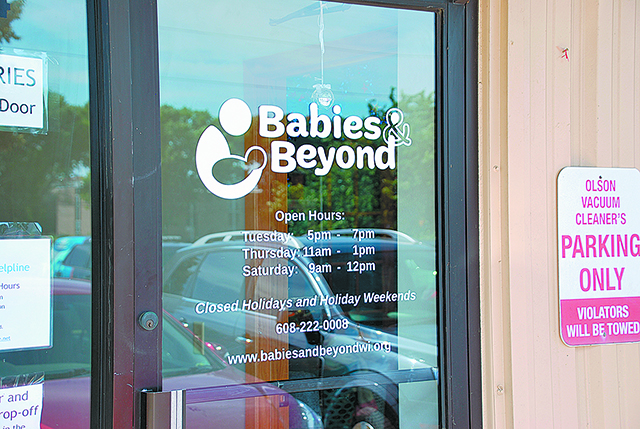
MADISON — Celebrating 40 years of service to the Madison community, Pregnancy Helpline of Madison rebranded itself as Babies & Beyond of Wisconsin just as news came out that Roe v. Wade was overturned on June 24.
“It just happened to be a very coincidental time,” said Executive Director Brenda Collins.
Discussions about changing the name began about two years ago, just before the Sharing Center and Diaper Bank moved from its location in the Catholic Multicultural Center on Madison’s south side to its new larger location on Stoughton Rd.
“We had a tiny little space in the basement and were taking over their little storage area,” said Collins. “So this space is definitely a lot bigger. We can get a lot more people in. We are serving about 500 a month, so on an open hours day like on Tuesday night, we can serve anywhere from 50 to 70 people in those two hours. It gets really packed in here.”
The rebranding decision came about due to a need to clarify what type of services the center offers families.
Primarily they offer free supplies to pregnant women and caregivers — parents, foster parents, guardians — of children from infants to four years old. Clients are able to visit the Sharing Center and Diaper Bank once a month to obtain maternity clothes, nursing supplies, formula, diapers, clothing, toys, and other supplies.
In addition to these services, they also offer baby care packages to be delivered to new mothers after birth, a safe sleep program which provides caregivers with a brand-new Pack n’ Play, classes, and a helpline.
“What we were finding when talking to other agencies [and] social workers [is] that a lot of clients weren’t taking our material,” she said. “They would see [our former name] and say ‘well, I’m not pregnant’ or ‘I already know I want my baby. I don’t need to call.’ We want our clients to see right away by the name that ‘They can help me right away with my baby or my toddler, my early childhood. They can help with the diapers and the supplies needed.’”
Forty years of service
The center, founded in 1982, began primarily as a 24-hour helpline and gradually grew into what it is today. While the helpline still exists, there are no longer volunteers on call 24/7. Collins admitted this was less than ideal but said they’d moved away from this model largely due to changes in technology.
“Most people are googling or texting or emailing to find the information out in a different way than they did 40 years ago,” she said. “We have programs [in the area] already in place that are better equipped for counseling [and] medical services. So we are referring them out to Women’s Care Center or Care Net anyway. We are just trying to remove the middle person and get them over to those services right away directly.”
Most of the center’s clients come from referrals from other organizations in the community.
“We’re working really closely with a lot of different organizations, even the food pantry [and] shelters,” she said. “We are trying to connect so that we are all working together, supporting each other. I think that is the beauty of being in a non-profit and being in this situation. We found out what we’re really good at and we’re going to focus on that and do that really well and connect them to somebody else that does what they do really well.”
In terms of volunteers, Collins said that the center has a wonderful supply of people willing to help out, but that they are always welcoming more.
“We usually have about 350 volunteers that come throughout the year and donate their time,” she said. “There’s always stuff to do. What we need more of is delivery volunteers. We’ve seen an uptick in clients requesting delivery of diapers and other goods because a lot of them can’t get to the center once a month.”
Increased need
She also said that, with the reversal of Roe v. Wade, a lot of people have been asking if they think they’ll be seeing an uptick in clients and people needing their services.
“Yes, I do believe that there is going to be an increase,” said Collins. “We have been seeing an increase over the years, and we’re ready for it. We’ve got open arms ready to welcome any family that needs that help and support, and we need that extra support and donations to keep up with the demand that is coming.”
When it comes to what supplies to donate, Collins said it is a good idea to ask the center what is needed.
“There’s a lot of misconceptions of what we need,” she said. “We are always low on size six [diapers]. Every week, I have to make multiple trips to multiple stores to get enough to serve for the week. It is our most requested size, but it is our least donated one. So there’s a lot of misconceptions of what we need. People think they are being helpful by getting the smaller ones, [but] they grow out of them too quickly. [A child] could be in a size five or six for two years.”
“To a lot of people, it might just seem small — like a diaper or a piece of clothing — but what it’s providing is a little less stress for parents, so that they can focus on loving their child, creating that positive and loving environment at home, and being the best parents that they can be,” said Collins.
For more information about Babies & Beyond, visit babiesandbeyondwi.org

